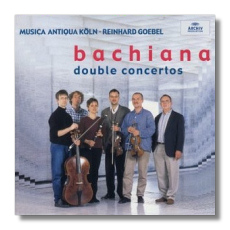
The Internet's Premier Classical Music Source
Related Links
- W.F. Bach Reviews
- Latest Reviews
- More Reviews
-
By Composer
-
Collections
DVD & Blu-ray
Books
Concert Reviews
Articles/Interviews
Software
Audio
Search Amazon
Recommended Links
Site News
 CD Review
CD Review
Bachiana

Double Concertos
- Johann Christian Bach: Sinfonia concertante in A Major, W C 34 (T 284/4)
- Wilhelm Friedemann Bach: Flute Concerto in D Major, BR WFB C 15
- Johann Christoph Friedrich Bach: Concerto in E flat for Fortepiano and Viola, BR JCFB C 44
- Carl Philipp Emmanuel Bach: Concerto in E flat for Harpsichord and Fortepiano, H 479 (Wq 47)
Stephan Schardt, violin
Reinhard Goebel, viola
Joachim Fiedler, cello
Verena Fischer, transverse flute
Robert Hill, fortepiano
Léon Berben, harpsichord
Musica Antiqua Köln/Reinhard Goebel
Deutsche Grammophon Archiv 471579-2 DDD 77:19
The first volume of "Bachiana" (DG Archiv 471150-2) contained music by Bachs older than Johann Sebastian, the most famous Bach of all. This second volume contains music by four of Bach's sons. The oldest, Wilhelm Friedemann, was born in 1710, and the youngest, Johann Christian, was born in 1735. (Johann Sebastian Bach was as prolific with children as he was with music.)
Not all of Bach's sons were equally talented, but it is astonishing to contemplate what excellent and even occasionally inspired composers many of them were. Johann Christian (1735-1782) spent part of his career in London and was spoken of in the same breath as his younger rival, Wolfgang Mozart. The Sinfonia concertante recorded here features the violin and cello as soloists. It is a likeable, dignified work that looks back at Handel as much as it looks forward to Haydn. In contrast, Johann Christoph Friedrich Bach (1732-1795), three years Johann Christian's junior, was not a traveler, nor was he a bridge into musical styles to come. Nevertheless, his Double Concerto for Fortepiano and Viola is imposing, and it is impossible to doubt his originality and fecundity after hearing as little as the orchestral exposition – so much is going on!
Wilhelm Friedemann's Flute Concerto (not a double concerto at all!) was recently rediscovered in Kiev. (This Bach's dates were 1710-1784.) The skittish-themed first movement sounds more like the work of his father than anything else on this CD. The concerto's interest is increased by Wilhelm Friedemann's use of a smaller string ensemble to provide textural contrast with the larger group.
Perhaps my favorite of Bach's sons was Carl Philipp Emanuel Bach (1714-1888); his witty Double Concerto for Harpsichord and Fortepiano is this disc's highlight. Annotator and fortepianist Robert Hill suggests that this was the last "significant" composition for harpsichord until the instrument was revived in the twentieth century. The unusual combination of soloists might suggest a contest of sorts – the nascent fortepiano stomping out the fading harpsichord – but the truth of the matter is that Carl Philipp Emanuel Bach creates a delightful, even mischievous repartee for the two soloists, who coexist as equals. (I hear the harpsichord as a cackling uncle who is out to gently corrupt his young nephew the fortepiano.)
Musica Antiqua Köln is a long-lived "authentic instruments" ensemble that has recorded extensively for DG Archiv. As usual, their energetic playing is characterized by clarity and clear-eyed objectivity. The soloists, most (if not all) members of MAK, step up to the plate with a serene and secure confidence also typical of the ensemble. The engineering is perfect.
Copyright © 2003, Raymond Tuttle




















